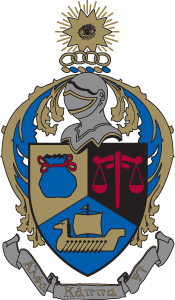| Term | Year | President | Vice President | NE Quad Director | MW Quad Director | S Quad Director | W Quad Director | LA Regional Director | ME Regional Director | ACSA Liaisons | AIA Liaisons | NCARB Liaison | NOMA Liaison | Executive Director |
|---|
| 2022-2023 | 66 | Cooper Moore, AIAS, Assoc. AIA, GRP, Kent State University | Nicole Bass, AIAS, City College of New York | Julia Andor, AIAS, New York Institute of Technology - Long Island | Ethan Sandburg, AIAS, University of Kansas | Colt Brock, AIAS, Georgia Institute of Technology | Tristan Osorio, AIAS, University of Nevada Las Vegas | Paulina Garza, AIAS, Universidad de Monterrey | Marcelle El Achkar, AIAS, Holy Spirit University of Kaslik | Beth Lundell Garver, AIA, NCARB, Cambridge, MA | Ricardo Rodriguez, Assoc AIA, LEED AP, ACI, Kensington, MD | Anne Smith, FAIA, NCARB, LEED BD+C, Savannah, GA | Catherine Chattergoon, NOMA, AIAS, Pratt Institute | Larry Hoffer |
| 2021-2022 | 65 | Scott Cornelius, AIAS, Assoc. AIA, Oklahoma State University | Shannon DeFranza, AIAS, Roger Williams University | Elizabeth Caccavano, AIAS, Temple University | Baili Null, AIAS, Washington University in St. Louis | Jessie Cart, AIAS, Savannah College of Art and Design | Nicholas Romero, AIAS, University of New Mexico | Adan Hernandez, AIAS, University of Texas - Arlington | Vanessa Abou Harb, AIAS, Lebanese American University | Beth Lundell Garver, AIA, NCARB, Cambridge, MA | Ricardo Rodriguez, Assoc AIA, LEED AP, ACI, Kensington, MD | Kristine Harding, FAIA, NCARB, Huntsville, AL | Montre'ale Jones, NOMA, AIAS University of Kentucky | Ashley Ash, Interim Executive Director, Larry Hoffer |
| 2020–2021 | 64 | Erin Conti, AIAS, Assoc. AIA, Illinois Institute of Technology | Sara Taketatsu, AIAS, University of Colorado - Boulder | Shannon DeFranza, AIAS, Roger Williams University | Cooper Moore, AIAS, Kent State University | Scott Cornelius, AIAS, Oklahoma State University | Alex Geisen, AIAS, Washington State University | Fernando Rivera, AIAS, University of Texas at Austin | Gaelle Bazergi, AIAS, Holy Spirit University of Kaslik | Ikhlas Sabouni, Arch D., RA, Prairie View A & M | Ricardo Rodriguez, Assoc AIA, LEED AP, ACI, Kensington, MD | Kristine Harding, FAIA, NCARB, Huntsville, AL | position established | Ashley Ash, Interim Executive Director |
| 2019–2020 | 63 | Sarah Curry, AIAS, Assoc. AIA, Auburn University | Adam Fogel, AIAS, Illinois Institute of Technology | Noor Ul Ain, AIAS, City College of New York | Erin Conti, AIAS, Illinois Institute of Technology | Kyra Stark, AIAS, Auburn University | Sara Taketatsu, AIAS, University of Colorado - Boulder | | | Ikhlas Sabouni, Arch D., RA, Prairie View A & M | Timothy Hawk, FAIA, Columbus, OH | Kristine Harding, FAIA, NCARB, Huntsville, AL | | Karma Israelsen, MA |
| 2018–2019 | 62 | Amy Rosen, AIAS, Assoc. AIA, Carnegie Mellon University | Brigid Callaghan, AIAS, Kent State University | Mike Chiappa, AIAS, New Jersey Institute of Technology | Adam Fogel, AIAS, Illinois Institute of Technology | Paul Bamson, AIAS, University of Tennessee Knoxville | Dominic Armendariz, AIAS, University of Nevada, Las Vegas | | | Ikhlas Sabouni, Arch D., RA, Prairie View A & M | Timothy Hawk, FAIA, Columbus, OH | Dennis Ward, FAIA, NCARB | | Nick Serfass, FAIA, CAE |
| 2017–2018 | 61 | Keshika De Saram, AIAS, Assoc. AIA, University of Minnesota | Elizabeth Seidel, AIAS, Assoc. AIA, Montana State University | Amy Rosen, AIAS, Carnegie Mellon University | Brigid Callaghan, AIAS, Kent State University | Sarah Curry, AIAS, Auburn University | Caitlin Kessler, AIAS, University of Arizona | | | Carmina Sanchez Arch D., RA, Hampton University | Timothy Hawk, FAIA, Columbus, OH | Dennis Ward, FAIA, NCARB | | Nick Serfass, FAIA, CAE |
| 2016–2017 | 60 | Sarah Wahlgren, AIAS, Assoc. AIA, Auburn University | Rachel Law, AIAS, Assoc. AIA, Ryerson University | Clayton Daher, AIAS, Roger Williams University | Jeremy Gentile, AIAS, Illinois Institute of Technology | Jenn Elder, AIAS, University of Tennessee at Knoxville | Elizabeth Seidel, AIAS, Montana State University | | | Carmina Sanchez Arch D., RA, Hampton University | Steve Vogel, FAIA, Detroit, Michigan | Dennis Ward, FAIA, NCARB | | Nick Serfass, AIA, CAE |
| 2015–2016 | 59 | Danielle Mitchell, Pennsylvania State University | Joel Pominville, Clemson University | Rachel Law, Ryerson University | Danielle Jones, Kent State University | Sarah Wahlgren, Auburn University | Ashley Kopetzky, University of Oregon | | | Greg Hall, PhD, AIA, NCARB, Mississippi State University | Steve Vogel, FAIA, Detroit, Michigan | (position created by the Council of Presidents) | | Nick Serfass, AIA, CAE |
| 2014–2015 | 58 | Charlie Klecha, School of the Art Institute of Chicago | Obiekwe Okolo, University of Texas San Antonio | Danielle Mitchell, Pennsylvania State University | Nicole Gerou, Lawrence Technological University | Joel Pominville, Clemson University | Kirsten Keane, Arizona State University | | | Greg Hall, PhD, AIA, NCARB, Mississippi State University | Nick Docous, AIA, Sacramento, California | | | Nick Serfass, AIA, CAE |
| 2013–2014 | 57 | Westin Conahan, University of Nevada, Las Vegas | Jennifer Taylor, Tuskegee University | Dave Golden, Drexel University | Ryan Gann, Illinois Institute of Technology | Obiekwe Okolo, University of Texas San Antonio | Andrea Young, The University of Arizona | | | Marleen Kay Davis, University of Tennessee | Nick Docous, AIA, Sacramento, California | | | Lenore M. Lucey, FAIA, interim executive director;
Joshua Caulfield, IOM |
| 2012–2013 | 56 | Matthew A. Barstow, University of New Mexico | Brent A. Castro, University of Tennessee Knoxville | Interim: Danielle Mitchell, Pennsylvania State University | Jason Soderlund, University of Illinois at Urbana–Champaign | Miyuki Tsujimura, University of North Carolina at Charlotte | Westin Conahan, University of Nevada, Las Vegas | | | Marleen Kay Davis, University of Tennessee | Chris Morrison, FAIA, LEED AP BD+C, Washington, DC | | | Joshua Caulfield, IOM |
| 2011–2012 | 55 | Nick Mancusi, Taliesin, the Frank Lloyd Wright School of Architecture | Laura Meador, Louisiana State University | Becky Joyce, Drexel University | Bryce Gamper, Lawrence Technological University | Brent A. Castro, University of Tennessee Knoxville | Matthew A. Barstow, University of New Mexico | | | Thomas Dutton, Miami University | Chris Morrison, FAIA, LEED AP BD+C, Washington, DC | | | Joshua Caulfield, IOM |
| 2010–2011 | 54 | Tyler W. Ashworth, University of Idaho | Danielle McDonough, Northeastern University | Jared E. McKnight, Penn State University | Michelle Morehead, University of Nebraska-Lincoln | Laura Meador, Louisiana State University | Nick Mancusi, Taliesin, the Frank Lloyd Wright School of Architecture | | | Thomas Dutton, Miami University | Ed Zeigler, FAIA, Greenville, South Carolina | | | Joshua Caulfield, IOM |
| 2009–2010 | 53 | Je'Nen M. Chastain, University of North Carolina at Charlotte | Brett Roeth, Miami University | Dave M.A. Guerriero, Philadelphia University | Jared Sang, Kansas State University | Sarah Able, University of Oklahoma | Tyler W. Ashworth, University of Idaho | | | Bradford Grant, Howard University | Ed Zeigler, FAIA, Greenville, South Carolina | | | Susan Zuber, interim executive director;
Michael Geary, CAE |
| 2008–2009 | 52 | JW Blanchard, Southern Polytechnic State University | Deana Moore, University of North Carolina at Charlotte | Anna McCorvey, Howard University | Ashley Wilson, Ball State University | Je'Nen M. Chastain, University of North Carolina at Charlotte | Amy Perenchio, Washington State University | | | Bradford Grant, Howard University | Stephen K. Loos, FAIA, Lyons, Colorado | | | Michael Geary, CAE |
| 2007–2008 | 51 | Andrew C. Caruso, Carnegie Mellon University | Tony P. Vanky, Tulane University | Danielle McDonough, Northeastern University | Brian Dennen, Iowa State University | JW Blanchard, Southern Polytechnic State University | Henry G. Schneider, University of Hawaii at Manoa | | | David Mohney, University of Kentucky | Stephen K. Loos, FAIA, Lyons, Colorado | | | Michael Geary, CAE |
| 2006–2007 | 50 | Jonathan K. Bahe, University of Minnesota | Catherine McNeel, Mississippi State University | Andrew C. Caruso, Carnegie Mellon University | Brian Dennen, Iowa State University | Melissa Schricker, Auburn University | Daniel Brown, University of Nevada-Las Vegas | | | David Mohney, University of Kentucky | Glenn H. Fellows, AIA, SMPC Architects | | | Michael Geary, CAE |
| 2005–2006 | 49 | Eric Zaddock, Andrews University | Matthew Fochs, University of Wisconsin at Milwaukee | Travis Bridges, Wentworth Institute of Technology | Jonathan K. Bahe, University of Minnesota | Stuart Thiel, University of Florida | Sean Beatty, Washington State University | | | | | | | Michael Geary, CAE |
| 2004–2005 | 48 | Jacob R. Day, University of Maryland | Trinity Simons, University of Arkansas | | Eric Zaddock, Andrews University | Ashley Wood, University of North Carolina at Charlotte | Ryan McEnroe, Arizona State University | | | | | | | Michael Geary, CAE |
| 2003–2004 | 47 | Wayne Mortensen, University of Nebraska | Katherine Bojsza, Carnegie Mellon University | Jason Nguyen, Drexel University | Randall Holl, University of Minnesota | Trinity Simons, University of Arkansas | Robert Williams, University of New Mexico | | | Thomas Fowler IV, Cal Poly San Luis Obispo | | Thomas R. Mathison, AIA, Tower Pinkster Titus Associates, Inc. | | Michael Geary, CAE |
| 2003–2004 | 46 | Lawrence Fabbroni, Carnegie Mellon University | Jeanine Gunderson, University of Idaho | Katherine Bojsza, Carnegie Mellon University | Eric Hegre, University of Wisconsin-Milwaukee | Leon Geoxavier, Tulane University | Sarah Peden, University of Southern California | | | Thomas Fowler IV, Cal Poly San Luis Obispo | Wayne Silberschlag, AIA Burlini/Silberschlag Ltd. | | | Pam Kortan Day |





















